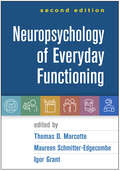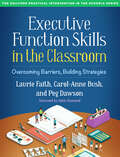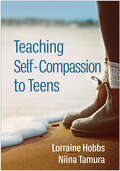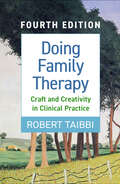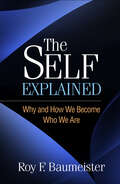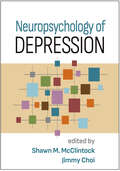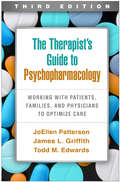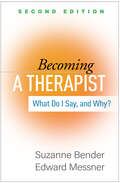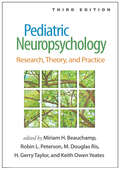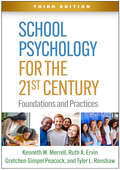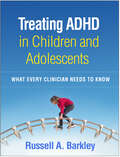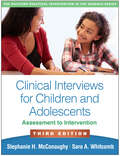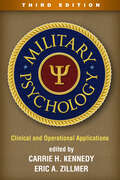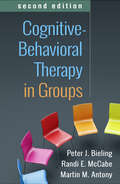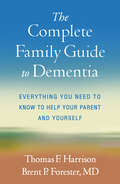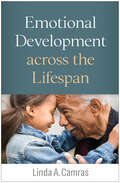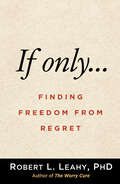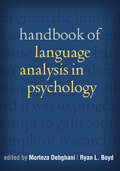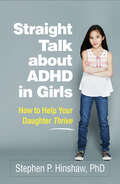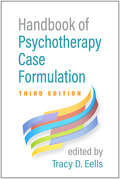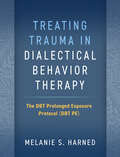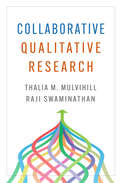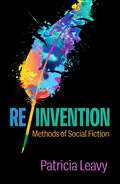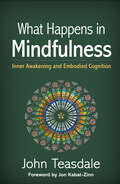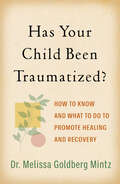- Table View
- List View
Neuropsychology of Everyday Functioning, Second Edition
by Thomas D. Marcotte Maureen Schmitter-Edgecombe Igor GrantThe go-to resource for assessing and predicting functional abilities in persons with brain injury or cognitive decline has now been revised and expanded to reflect significant advances in the field. With a focus on key real-world capacities--independent living, vocational functioning, medication management, and driving--leading experts explore how individuals go about their daily lives, where and why disruptions occur, and potential opportunities for improving function. Strategies for direct assessment are reviewed, from standard neuropsychological tests to multimodal approaches and technology-based tools. Chapters also provide functional assessment guidance for specific neurological and psychiatric conditions: dementia, traumatic brain injury, depression, schizophrenia, and others. New to This Edition *Incorporates over a decade of technological and methodological innovations. *Chapter on theories and models of everyday functioning. *Chapters on naturalistic assessment, wearable sensors, ambulatory assessment, and virtual-reality-based tools. *Practical clinical implications are highlighted throughout.
Executive Function Skills in the Classroom: Overcoming Barriers, Building Strategies (The Guilford Practical Intervention in the Schools Series)
by Laurie Faith Carol-Anne Bush Peg DawsonWith insight and humor, this motivating guide shows how to bring executive functions (EF) to the forefront in K–8 classrooms--without adopting a new curriculum or scripted program. Ideal for professional development, the book includes flexible, practical, research-based ideas for implementation in a variety of classroom contexts. It shares stories from dozens of expert teachers who are integrating explicit EF support across the school day. Provided is a clear approach for talking about EF barriers and strategies as part of instruction, and working as a class to problem-solve, explore, and apply the strategies that feel right for each student. Purchasers get access to a Web page where they can download and print several reproducible tools in a convenient 8 1/2" x 11" size. This book is in The Guilford Practical Intervention in the Schools Series, edited by Sandra M. Chafouleas.
Teaching Self-Compassion to Teens
by Lorraine Hobbs Niina TamuraGrounded in knowledge about the unique developmental challenges of adolescence, this book presents an innovative approach for teaching self-compassion to teens and young adults in clinical, educational, or community settings. Lorraine Hobbs and Niina Tamura provide guided practices, creative exercises, and teaching strategies adapted from Kristin Neff and Christopher Germer&’s widely disseminated Mindful Self-Compassion program for adults. Case examples, sample dialogues, and scripts illustrate how to set up and run successful groups that address teen concerns such as self-criticism, self-esteem, social comparison, and strong emotions. The book offers guidelines for cultivating a personal practice and working with parents. Tips for providing a safe, effective learning environment are woven throughout; a special chapter covers trauma-sensitive teaching.
Doing Family Therapy, Fourth Edition: Craft and Creativity in Clinical Practice
by Robert TaibbiEngaging, practical, and infused with clinical wisdom, this widely used text and practitioner guide helps therapists working with families to hit the ground running. The revised and updated fourth edition brings fresh insights into the issues families bring to therapy and the therapist's moment-to-moment decision making. Rather than advocating one best approach, Robert Taibbi shows that there are multiple ways to guide parents, children, and adolescents and harness their strengths. The beginning, middle, and end stages of treatment are richly illustrated with chapter-length case examples. End-of-chapter learning exercises help readers build key skills and creatively develop their own clinical style. New to This Edition *All chapters revised, with new case studies throughout. *Sidebars on common challenges facing new clinicians: self-doubt, the emotional experience of working with distressed families, and more. *Increased attention to what the therapist can say and do to actively shape each session. *Heightened focus on process--helping families explore the "how" of problem solving as much as the "what." See also the author's Doing Couple Therapy, Second Edition: Craft and Creativity in Work with Intimate Partners.
The Self Explained: Why and How We Become Who We Are
by Roy F. BaumeisterThe idea of the self is immediately familiar to everyone, yet elusive to define and understand. From pioneering researcher Roy F. Baumeister, this volume synthesizes a vast body of knowledge to provide a panoramic view of the human self--how it develops and functions, why it exists, and what problems it encounters on the journey through life. What are the benefits of self-knowledge, and how attainable is it? Do we have one self, or many? What is the relationship of self and society? In 28 concise chapters, Baumeister explains complex concepts with clarity and insight. He reveals the central role played by the self in enabling both individuals and cultures to thrive.
Neuropsychology of Depression
by Shawn M. McClintock and Jimmy ChoiTimely and authoritative, this unique volume focuses on neurocognitive aspects of depression and their implications for assessment, evaluation, clinical management, and research. Experts in the field explore the impact of depression on executive function, learning and memory, working memory, and other critical capacities, and present cutting-edge assessment tools and procedures. The neurocognitive effects of widely used antidepressant treatments are reviewed, from psychotropic medications and evidence-based psychotherapies to established and emerging neuromodulation technologies. Practical aspects of working with adults across the lifespan with depression are addressed, including ways to strengthen treatment engagement and adherence, and to incorporate cultural considerations.
The Therapist's Guide to Psychopharmacology, Third Edition: Working with Patients, Families, and Physicians to Optimize Care
by JoEllen Patterson James L. Griffith Todd M. EdwardsNow in a revised and updated third edition, this noted practitioner guide and text incorporates the latest knowledge about psychopharmacology and collaborative care. Therapists and counselors learn when and how to make medication referrals and how to address patients' questions about drug benefits, side effects, safety, and more. Organized around frequently encountered mental health disorders, the book explains how medications work (including what they can and cannot accomplish). Strategies for collaborating successfully with patients, their family members, and prescribers are discussed in detail. Written for optimal practical utility, the text features case examples, sample referral letters, checklists, and a glossary. New to This Edition *Chapter on the therapeutic relationship. *New separate chapter on bipolar disorder. *Expanded discussions of distinguishing psychiatric illness from normal distress, optimizing collaboration with psychiatrists, how medications work in the brain, treatment of chronic pain, and more. *Additional case vignettes and psychopharmacology "rules of thumb."
Becoming a Therapist, Second Edition: What Do I Say, and Why?
by Suzanne Bender Edward MessnerRevised and expanded for the digital age, this trusted guidebook and text helps novice psychotherapists of any orientation bridge the gap between coursework and clinical practice. It offers a window into what works and what doesn't work in interactions with patients, the ins and outs of the therapeutic relationship, and how to manage common clinical dilemmas. Featuring rich case examples, the book speaks directly to the questions, concerns, and insecurities of novice clinicians. Reproducible forms to aid in treatment planning can be downloaded and printed in a convenient 8 1/2" x 11" size. New to This Edition *Reflects two decades of technological changes--covers how to develop email and texting policies, navigate social media, use electronic medical records, and optimize teletherapy. *New chapters on professional development and on managing the impact of therapist life events (pregnancy and parental leave, vacations, medical issues). *Instructive discussion of systemic racism, cultural humility, and implicit bias. *Significantly revised chapter on substance use disorders, with a focus on motivational interviewing techniques. *Reproducible/downloadable Therapist Tools.
Pediatric Neuropsychology, Third Edition: Research, Theory, and Practice
by Miriam H. Beauchamp, Robin L. Peterson, M. Douglas Ris, H. Gerry Taylor and Keith Owen YeatesRecognized as the definitive reference and text on the relationship between brain health and behavior in children and adolescents, this volume is now in a third edition with 75% new material, including major updates throughout and numerous new chapters. Leading experts provide a neuropsychological perspective on medical, neurological, genetic, and developmental disorders that are frequently seen in clinical practice. The volume examines the impact of each condition on the developing brain; explores associated cognitive, behavioral, and psychosocial impairments; and shows how the science translates into achieving better outcomes for children. New to This Edition *Reflects 12 years of significant research advances and the expanding role of pediatric neuropsychologists; increased attention to evidence-based intervention throughout. *Chapters on additional medical and neurodevelopmental conditions: pediatric stroke, congenital heart disease, type 1 diabetes, and movement disorders. *Section on genetic disorders: fragile X, Williams syndrome, 22q11.2 deletion syndrome, and Down syndrome. *Section on emergent and controversial conditions: nonverbal learning disabilities, dysexecutive syndrome, pediatric acute-onset neuropsychiatric syndrome, and sluggish cognitive tempo.
School Psychology for the 21st Century, Third Edition: Foundations and Practices
by Kenneth W. Merrell Ruth A. Ervin Gretchen Gimpel Peacock Tyler L. RenshawNow in a revised and updated third edition reflecting a decade of changes in the field, this leading text prepares new practitioners to support all students' academic, behavioral, and social–emotional success. The multiple roles and functions of the school psychologist are described and illustrated with vivid vignettes. Readers gain vital skills for planning and implementing evidence-based prevention and intervention efforts and collaborating to facilitate systems change. Guided by a problem-solving perspective, the book provides tools for effective, culturally responsive practice in today's diverse schools. End-of-chapter discussion questions and activities enhance learning. New to This Edition *Incorporates key advances in evidence-based assessment, intervention, and multi-tiered systems of support. *Increased attention to supporting the growing numbers of culturally and linguistically diverse students in schools. *Addresses changes in school psychology training programs and professional standards. *New emphasis on implementation science.
Treating ADHD in Children and Adolescents: What Every Clinician Needs to Know
by Russell A. BarkleyFrom foremost authority Russell A. Barkley, this book presents essential principles and practices for managing attention-deficit/hyperactivity disorder (ADHD) in children and teens. Barkley interweaves the best scientific knowledge with lessons learned from decades of clinical practice and research. He provides guidelines and clinical tips for conducting thorough, accurate assessments and developing and implementing science-based treatment plans. The book is grounded in Barkley's theory of ADHD as a disorder of executive functioning and self-regulation. Ways to collaborate successfully with parents and other professionals are highlighted throughout. In a convenient large-size format, the volume includes 45 reproducible handouts and forms that can be downloaded and printed for repeated use.
Clinical Interviews for Children and Adolescents, Third Edition: Assessment to Intervention (The Guilford Practical Intervention in the Schools Series)
by Stephanie H. McConaughy Sara A. WhitcombWidely recognized as an authoritative resource, this book has been revised and updated with the latest research and techniques, including new material on telehealth services. Guidelines are provided for conducting thorough, developmentally informed interviews with K–12 students--and their parents and teachers--for multimethod assessment and intervention planning. Extensive case examples illustrate how to elicit information about school functioning, peer relations, emotional and behavioral difficulties, family situations, and adolescent concerns. Two guest authors have contributed chapters on suicide and violence risk assessments. In a convenient large-size format, the book includes over a dozen reproducible interviewing tools; purchasers get access to a Web page where they can download and print the reproducible materials. New to This Edition *Incorporates the latest information on bullying, cyberbullying, and victimization; sexual- and gender-minority youth; social media and smartphone use; and adolescent substance use. *Discusses strategies, tips, and caveats for conducting virtual interviews. *Expanded coverage of cultural and linguistic biases in assessment and how practitioners can build multicultural competence. *Revised and expanded reproducible tool: Semistructured Student Interview--Second Edition. This book is in The Guilford Practical Intervention in the Schools Series, edited by Sandra M. Chafouleas.
Military Psychology, Third Edition: Clinical and Operational Applications
by Carrie H. Kennedy and Eric A. ZillmerWith more than 60% new material reflecting advances in evidence-based treatments and the evolving roles of military mental health providers, the authoritative resource in the field is now in a significantly revised third edition. The volume provides research-based roadmaps for prevention and intervention with service members and veterans in a wide range of settings. Up-to-date information about military procedures and guidelines is included throughout. Grounded in current knowledge about stress and resilience, chapters describe best practices in treating such challenges as depression, anxiety disorders, posttraumatic stress disorder, and substance use disorders. Also addressed are operational functions of psychologists in personnel assessment and selection, counterintelligence, and other areas. New to This Edition *Chapters on new topics: the spectrum of military stress reactions, concussion management, military sexual assault, embedded/expeditionary psychological practice, and security clearance evaluations. *Fully rewritten chapters on evidence-based treatments, behavioral health in primary care, and disaster mental health. *Incorporates major shifts in how and where military mental health services are delivered.
Cognitive-Behavioral Therapy in Groups, Second Edition
by Peter J. Bieling Randi E. McCabe Martin M. AntonyThe leading guide to group-based cognitive-behavioral therapy (CBT) has now been significantly revised with 70% new material, reflecting over 15 years of research and clinical advances. Too often, CBT training resources treat groups as simply an extension of individual therapy. Filling an important need, this text helps students and practitioners build essential skills for leveraging group process to optimize outcomes. Featuring sample dialogues, clinical pointers, and troubleshooting tips, the book provides practical answers to group leaders' most pressing questions. Effective protocols for treating specific disorders are presented, with a focus on CBT techniques and group process factors unique to each type of group. New to This Edition *Chapters on inpatient groups and mindfulness-based CBT. *Chapters on additional disorders: posttraumatic stress disorder and borderline personality disorder. *Fully rewritten chapters on anxiety disorders, substance use disorders, and psychosis. *Discussions of timely topics, such as conducting virtual groups and the growth of transdiagnostic approaches. *Even more clinician friendly; streamlined chapters highlight "what to do when."
The Complete Family Guide to Dementia: Everything You Need to Know to Help Your Parent and Yourself
by Thomas F. Harrison Brent P. ForesterIf you are facing the unique challenges of caring for a parent with dementia, you are not alone. What do you do when your loved one so plainly needs assistance, but is confused, angry, or resistant to your help? Where can you find the vital information you need, when you need it? Journalist Thomas Harrison and leading geriatric psychiatrist Brent Forester show that you don&’t have to be a medical expert to be a good care provider in this authoritative guide. They explain the basics of dementia and offer effective strategies for coping with the medical, emotional, and financial toll. With the right skills, you can navigate changing family roles, communicate better with your parent, keep him or her safe, and manage difficult behaviors. Learn how to "care smarter, not harder"--and help your loved one maintain the best possible quality of life.
Emotional Development across the Lifespan
by Linda A. CamrasUnique in its dual focus on emotion and lifespan development, this text weaves together theory, research, and practical clinical implications for fostering children's emotional well-being. The author examines how emotions are experienced, expressed, understood, and regulated from infancy through later adulthood, surveying both typical and atypical development. For each stage, chapters highlight the interrelated influences of temperament, neurobiology, and the social environment, and distinguish universal processes from those that vary across cultures. The book presents current knowledge about specific emotions, probes the causes and consequences of emotional maladjustment, and reviews evidence-based and promising interventions. Innovative methods, examples, and meta-analyses are described; key terms are defined within chapters and in an end-of-book glossary.
If Only…: Finding Freedom from Regret
by Robert L. LeahyIt&’s hard to envision a life without some regrets. You imagine what might have been if you had taken a different path at some key juncture, whether about a past relationship, a missed job opportunity, or choosing where to live. Regret can be immobilizing, filling us with disappointment and shame--but it also can be a powerful tool for self-knowledge and change. In this uplifting guide, renowned psychologist Robert Leahy demonstrates how to make regret work to your advantage. Using cutting-edge skills based on cognitive-behavioral therapy, Dr. Leahy shows how to get unstuck from regret and make decisions with more clarity and confidence. Downloadable practical tools help you implement the strategies in the book. You are the author of your life, so go out and write the next chapter--and then live it.
Handbook of Language Analysis in Psychology
by Morteza Dehghani and Ryan L. BoydRecent years have seen an explosion of interest in the use of computerized text analysis methods to address basic psychological questions. This comprehensive handbook brings together leading language analysis scholars to present foundational concepts and methods for investigating human thought, feeling, and behavior using language. Contributors work toward integrating psychological science and theory with natural language processing (NLP) and machine learning. Ethical issues in working with natural language datasets are discussed in depth. The volume showcases NLP-driven techniques and applications in areas including interpersonal relationships, personality, morality, deception, social biases, political psychology, psychopathology, and public health.
Straight Talk about ADHD in Girls: How to Help Your Daughter Thrive
by Stephen P. HinshawParenting a daughter with attention-deficit/hyperactivity disorder (ADHD) is no easy path--especially because of the myth that the disorder is rare to nonexistent in girls. From pioneering researcher Stephen P. Hinshaw, this empowering guide provides vital information and advice to help you understand and meet your daughter's needs. Dr. Hinshaw delivers up-to-date facts on what ADHD is, why symptoms often appear differently in girls than in boys, why girls with ADHD behave the way they do, how to get an accurate diagnosis, and what treatments are most effective. There is so much pressure on girls to be "perfect"--and for those with ADHD, it feels especially hard to measure up. Learn concrete steps you can take to support your daughter's success from preschool through high school and beyond, while nurturing her confidence and self-worth.
Handbook of Psychotherapy Case Formulation, Third Edition
by Tracy D. EellsNow in a significantly revised third edition featuring 60% new material, this is the authoritative clinical reference and course text on a crucial psychotherapy skill. Leading practitioners of major psychotherapies describe step by step how to construct sound case formulations and use them to guide individualized treatment. Following a standard format, chapters cover the historical background of each case formulation approach, its conceptual framework and evidence base, multicultural considerations, steps in implementation, application to treatment planning and practice, and training resources. Rich case material includes examples of completed formulations. New to This Edition *Chapters on additional models: mindfulness-based cognitive therapy, acceptance and commitment therapy, couple therapy, and thematic mapping. *Chapters on specific approaches for personality disorders, suicidality, and panic disorder. *Expanded case examples now go beyond crafting the initial formulation to show how it shapes the entire course of therapy. *Prior-edition chapters are all updated or rewritten to reflect 15 years of advances in research, clinical practice, and training.
Treating Trauma in Dialectical Behavior Therapy: The DBT Prolonged Exposure Protocol (DBT PE)
by Melanie S. HarnedMany DBT clients suffer from posttraumatic stress disorder (PTSD), but until now the field has lacked a formal, tested protocol for exactly when and how to treat trauma within DBT. Combining the power of two leading evidence-based therapies--and designed to meet the needs of high-risk, severely impaired clients--this groundbreaking manual integrates DBT with an adapted version of prolonged exposure (PE) therapy for PTSD. Melanie S. Harned shows how to implement the DBT PE protocol with DBT clients who have achieved the safety and stability needed to engage in trauma-focused treatment. In a convenient large-size format, the book includes session-by-session guidelines, rich case examples, clinical tips, and 35 reproducible handouts and forms that can be downloaded and printed for repeated use.
Collaborative Qualitative Research
by Thalia M. Mulvihill Raji SwaminathanMeeting a key need for qualitative researchers, this practical book presents tools for creating productive partnerships and managing each phase of a collaborative project. The authors provide guidelines for working across disciplines, status differentials (such as professor and student), and geographical locations. Collaboration within particular qualitative traditions--cross-cultural research, duoethnography, participatory action research, arts-based collaborations, and others--is described and illustrated with exemplars of published studies. Readers learn how to build research teams, formulate research questions, gather and analyze data, and assess how collaborations are working. Ethical questions are highlighted throughout: Who owns collaborative research? Who decides what aspects of the findings should be disseminated? How can inequitable power relations be redressed? Within-chapter "Pedagogical Pathways" sections provide practice exercises and opportunities for reflection.
Re/Invention: Methods of Social Fiction (Qualitative Methods "How-To" Guides)
by Patricia LeavyFrom Patricia Leavy, a leader in arts-based research, this is the first comprehensive guide to what social fiction is and how to write it. In an engaging, personal tone, Leavy explores the unique contribution that creative writing--such as novels, series, and short stories--can make to addressing qualitative research questions. In-depth discussions of narrative models (such as the three-act structure) and elements (such as plot, metaphor, dialogue) are accompanied by excerpts from Leavy's published fiction, reflections on the writing process, and technical suggestions. The book offers evaluation criteria for social fiction as well as practical publishing advice. Instructive features include "tip bubbles" with additional writing hints, end-of-chapter "Skill-Building" and "Rethink Your Research" exercises, and an appendix with suggested readings.
What Happens in Mindfulness: Inner Awakening and Embodied Cognition
by John TeasdaleWell known for applying mindfulness to the treatment of depression, pioneering researcher John Teasdale now explores the broader changes that people can experience through contemplative practices. What goes on in our minds when we are mindful? What does it mean to talk of mindfulness as a way of being? From a scientific perspective, how do core elements of contemplative traditions have their beneficial effects? Teasdale describes two types of knowing that human beings have evolved--conceptual and holistic–intuitive--and shows how mindfulness can achieve a healthier balance between them. He masterfully describes the mechanisms by which this shift in consciousness not only can reduce emotional suffering, but also can lead to greater joy and compassion and a transformed sense of self.
Has Your Child Been Traumatized?: How to Know and What to Do to Promote Healing and Recovery
by Melissa Goldberg MintzWhen a child has been through an upsetting or stressful event, it can feel overwhelming. Is my child traumatized? Are new behaviors normal, or signs of PTSD? What can I do to make my child feel safe again? In this wise and authoritative guide, psychologist Melissa Goldberg Mintz assures loving parents that the tools necessary for supporting a traumatized child are ones they already possess, from promoting recovery at home, to knowing when professional help is needed. Dr. Goldberg Mintz shares specific, critical information and insights into what trauma looks like at different ages, why some kids exposed to the same event react very differently, how to help a child through trauma triggers, and more. Most important, she shows parents how to ensure that kids don&’t feel constrained by fear--and can face future challenges with hope and resilience.
